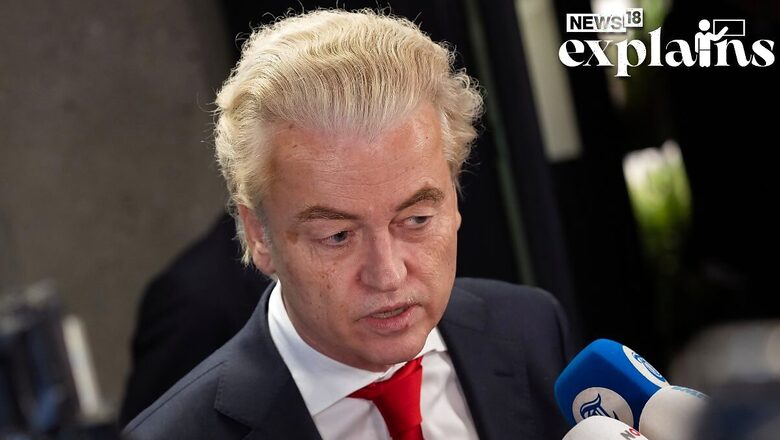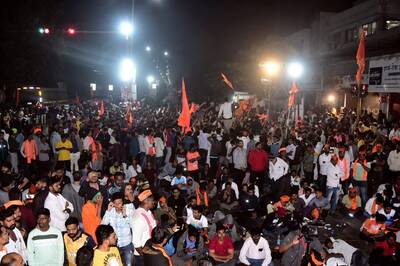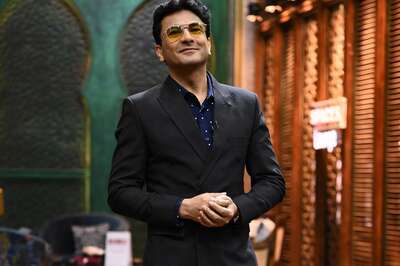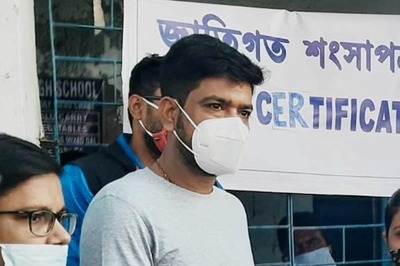
views
Anti-Islam populist and far right leader Geert Wilders has won a massive victory in the Netherlands’ election and is in pole position to form the next ruling coalition and possibly become the Netherlands’ next prime minister.
The result is sending shockwaves through Europe, where extremist nationalist ideology is putting pressure on democracies that now face the possibility of having to deal with the first far-right prime minister of the Netherlands.
With nearly all votes counted, Wilders’ Party for Freedom (PVV) was forecast to win 37 seats in the 150-seat lower house of parliament, more than double the 17 the party secured in the last election.
Known as the “Dutch Trump” both for his bouffant dyed hair and firebrand rhetoric, Geert Wilders’ anti-Islam, anti-immigrant and anti-EU message seems to have finally swept him to first place at the polls.
Shockwaves Through Europe
Geert Wilders, with his fiery tongue has long been one of the Netherlands’ best-known lawmakers at home and abroad. His populist policies and shock of peroxide blond hair have drawn comparisons with Trump.
Wilders has called for a “Nexit” referendum — a Dutch version of Brexit which saw the United Kingdom leave the European Union. He has also called for a total halt to accepting asylum-seekers and migrant pushbacks at Dutch borders and advocated the “de-Islamization” of the Netherlands.
His election campaign was based on curtailing migration — the issue that caused the last governing coalition to quit in July — and to tackle problems including the Netherlands’ cost-of-living crisis and housing shortages.
The historic victory came one year after the win of Italian Premier Giorgia Meloni, whose Brothers of Italy party had roots steeped in nostalgia for fascist dictator Benito Mussolini. Meloni has since mellowed her stance on several issues and has become the acceptable face of the hard right in the EU.
Anti-Islam Rhetoric
From calling Moroccans “scum” to holding competitions for cartoons of the Prophet Mohammed, Wilders has built a career from his self-appointed mission to stop an “Islamic invasion” of the West.
He has often been called the Dutch Donald Trump and convicted of insulting Moroccans and Britain once banned him from entering the country. In 2009, the British government refused to let him visit the country, saying he posed a threat to “community harmony and therefore public security.”
He has remained defiant despite brushes with the law — he was convicted for insulting Moroccans — and death threats that have meant he has been under police protection since 2004.
As for Islam, the manifesto of his PVV (Freedom Party) said, “the Netherlands is not an Islamic country. No Islamic schools, Korans and mosques.” He proposes banning the headscarf in government buildings.
Early Life
Born in 1963 in southern Venlo, close to the German border, Wilders grew up in a Catholic family with his brother and two sisters. His mother was half-Indonesian, a fact Wilders rarely mentions.
He developed an interest in politics in the 1980s, his older brother Paul told Der Spiegel magazine.
“He was neither clearly on the left or the right at the time, nor was he xenophobic. But he was fascinated by the political game, the struggle for power and influence,” Paul Wilders said.
His hatred of Islam appeared to have developed slowly. He spent time in Israel on a kibbutz, witnessing first-hand tensions with the Palestinians.
He was also shocked by the assassinations of far-right leader Pim Fortuyn in 2002 and the radical anti-Islam filmmaker Theo van Gogh in 2004.
Political Career
Wilders entered politics in 1998 in the Liberal VVD party. During his early days in politics, he started dying his brown hair blonde and learned his media-savvy ways, even as his views became increasingly silenced.
He is also set to become the longest-serving lawmaker in the Dutch parliament this year. He has been a member of the House of Representatives since 1998, first for the center-right People’s Party for Freedom and Democracy and later setting up his Party for Freedom.
He founded his own party in 2006 and in 2017 it became the second largest in parliament, falling back to third largest in 2021.
Controversial Stance
- His campaign platform has called for a referendum on the Netherlands leaving the European Union, an “asylum stop” and “no Islamic schools, Qurans and mosques.”
- In 2022, Wilders defended BJP leader Nupur Sharma over her derogatory comments on Prophet Muhammad, which led to a huge protest across India. “Nupur Sharma is a hero who spoke nothing but the truth. The whole world should be proud of her. She deserves the Nobel Prize. And India is a Hindu nation, the Indian government is obliged to strongly defend Hindus against Islamic hate and violence,” he said in a tweet praising Nupur Sharma’s remarks.
- Wilders, a staunch supporter of Israel, advocated shifting the Embassy of the Netherlands there to Jerusalem and closing the Dutch diplomatic post in Ramallah, home of the Palestinian Authority.
- He has called for breaking off diplomatic relations with countries with Sharia law and from where Dutch MPs have received death threats.
- His fiery anti-Islam rhetoric also has made him a target for extremists and led to him living under round-the-clock protection for years.
- On climate change, his PVV manifesto said “We have been made to fear climate change for decades… We must stop being afraid.’ The Dutch have the best water engineers in the world and there is no need to panic about rising sea levels, the document says.
- His party manifesto calls for more oil and gas extraction from the North Sea and keeping coal and gas power stations open.




















Comments
0 comment